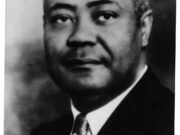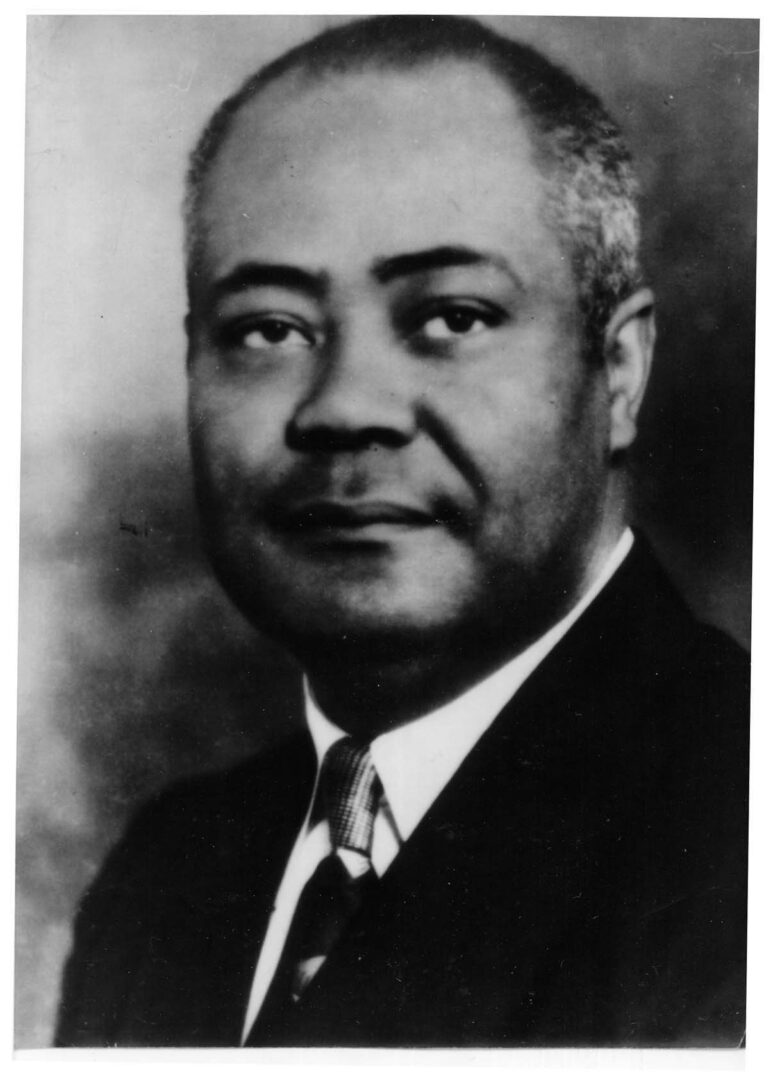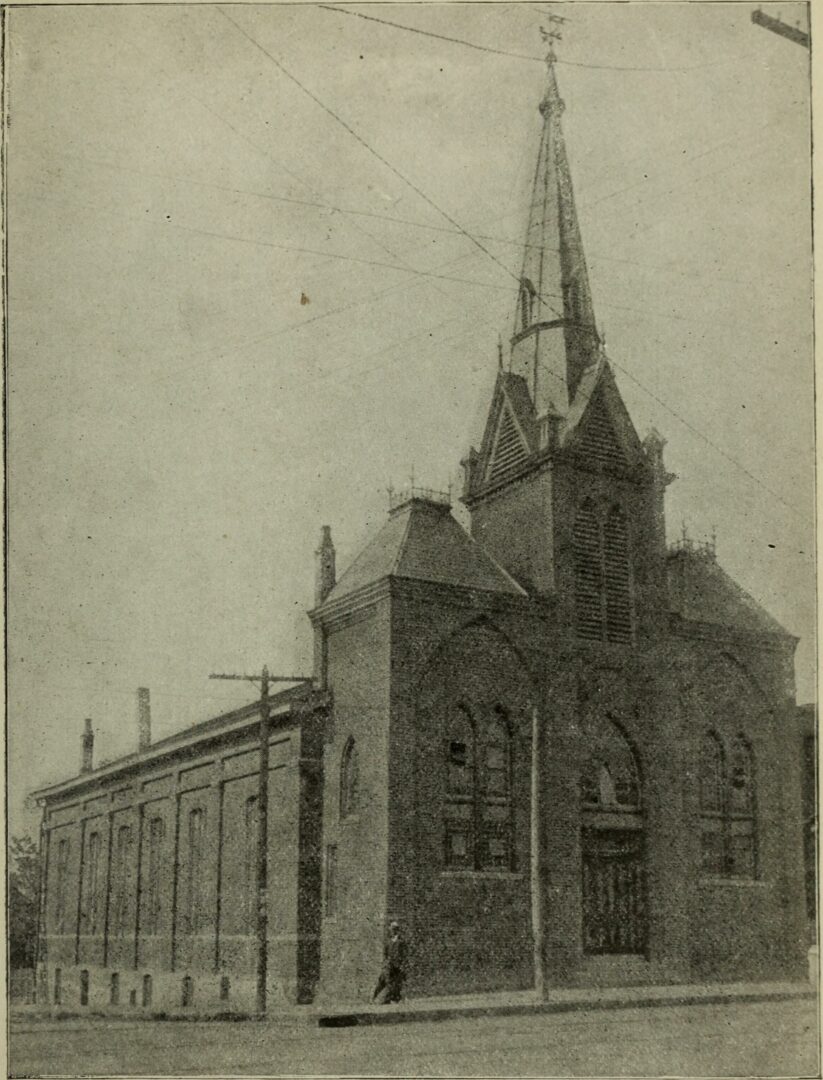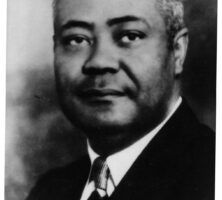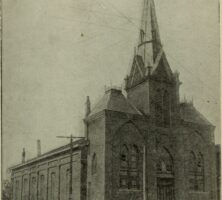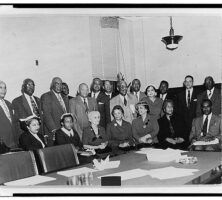Between 1937 and 1988, the Reverend William Holmes Borders served as pastor of Wheat Street Baptist Church in Atlanta, where he campaigned for civil rights and distinguished himself as a charismatic spokesperson for the city’s poor and dispossessed. Borders was instrumental in the hiring of Atlanta’s first Black police officers in the 1940s, led the campaign to desegregate the city’s public transportation in the 1950s, and established the nation’s first federally subsidized, church-operated rental housing project in the 1960s. Thereafter, he continued to support a variety of philanthropic causes and remained an influential public figure in Atlanta until his death in 1993.
Background
Borders was born in Macon on February 24, 1905, to Leila Birdsong and the Reverend James Buchanan Borders. His father served as pastor at Swift Creek Baptist Church; Borders later credited his own calling to his father’s influence and example.
After graduating from high school, Borders left home for Atlanta, where he attended Morehouse College. Despite running out of money after only two years, a number of sympathetic professors invited him to continue taking classes, and college president John Hope allowed the young man to graduate on the condition that he later repay the school.
Borders then attended Garrett Theological Seminary at Northwestern University in Evanston, Illinois, on scholarship. There, he gained exposure to the Social Gospel, which greatly influenced his commitment to social justice, and continued his courtship of Julia Pate, a graduate of Spelman College who was then attending the University of Chicago. The two were married in 1931 and later had two children, William Holmes Jr. and Juel Pate. He completed his bachelor of divinity degree the following year and then accepted the pastorate of the Second Baptist Church in Evanston. In 1936 he earned a master’s degree from Northwestern.
Early Career
After serving as pastor for five years in Evanston, Borders received an invitation to return to Morehouse as an instructor. A year later, in 1937, he was offered the pastorate at Wheat Street Baptist Church, a historic institution on Auburn Avenue that was suffering from indebtedness and declining membership. Eager to return to the pulpit, Borders readily accepted and began the difficult task of reversing the church’s fortunes.
At Wheat Street, Borders proved himself an able administrator, instituting new accounting practices and settling the church’s debts within a few years. He also reached out to the poor, often recruiting new members from the taverns and pool halls along Auburn Avenue despite the protestations of senior church elders.
News of Border’s unorthodox approach and impressive achievements spread throughout the city, and by 1940 the young minister was widely regarded as one of Black Atlanta’s most dynamic ministers and gifted orators. That year, a local radio station offered Borders weekly airtime to discuss matters of concern in the Black community.
For twelve minutes every Sunday, Borders addressed an integrated radio audience, covering a wide range of subjects that included segregation, disfranchisement, wartime patriotism, and northern Black migration, among others. The program was an immediate success, earning a large audience share among white and Black listeners and quickly becoming the second-highest-rated broadcast in Atlanta. Many of the city’s influential white businessmen listened regularly, and a number offered Borders their help in improving conditions for Atlanta’s Black population. Years later, Borders cited the broadcasts as an important first step in opening lines of communication between Atlanta’s Black and white communities. In 1943 the radio addresses were collected into a single volume and published as Seven Minutes at the Mike in the Deep South.
Civil Rights
Following World War II (1941-45), Borders and other leaders in Atlanta’s Black community became increasingly assertive in their pursuit of civil rights. Emboldened by the 1946 abolition of the white primary, the city’s Black leadership forged a powerful voting bloc and skillfully applied political pressure to win concessions from city hall.
When Borders and a handful of other Black leaders first approached Atlanta mayor William B. Hartsfield about hiring Black police officers in the mid-1940s, for example, they were quickly rebuffed. “I remember very distinctly,” recalled Borders, “going to Mayor Hartsfield and asking him for Black police. And he told us without the slightest blinking of an eye, that we’d get Black police about as soon as we’d get deacons in the First Baptist Church, white.” However, after Black voters provided the margin for victory in Hartsfield’s successful bid for reelection in 1946, the mayor became more receptive to their concerns. When Borders’s delegation returned in 1947 with the same request, Hartsfield simply asked, “How many do you want?”
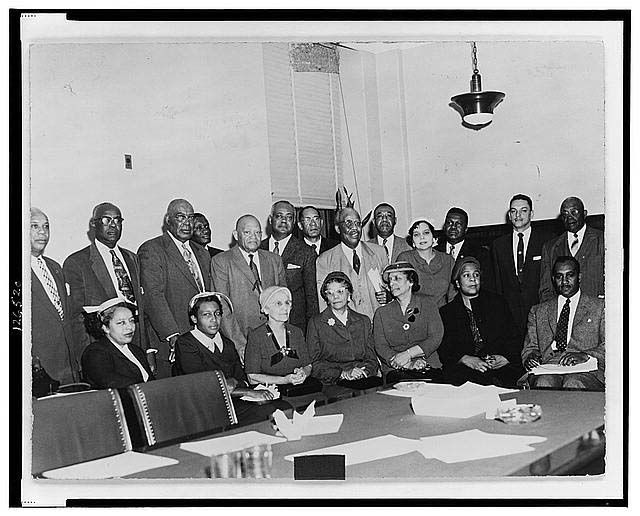
Courtesy of Library of Congress, Prints and Photographs Division
Thereafter, Borders and other members of Atlanta’s Black leadership maintained close ties with their counterparts in the white establishment, working behind the scenes and often coordinating civil rights activities to protect the city’s reputation for moderate race relations. Following the 1956 U.S. Supreme Court decision desegregating buses in Montgomery, Alabama, for example, Atlanta’s Black leadership launched the Love, Law, and Liberation (or Triple L) Movement in order to force the desegregation of Atlanta’s public transportation system. Under Borders’s leadership, the group notified Mayor Hartsfield of its intention to violate municipal statutes by riding at the front of city buses and requested the mayor’s support in facilitating a peaceful arrest. Because he sought to protect Atlanta’s reputation for harmonious race relations, Hartsfield agreed.
On January 9, 1957, Borders and five other Black ministers boarded a city bus and took their seats along the front rows. The driver returned the bus to the barn, and the ministers returned to the Wheat Street Baptist Church, where they were later arrested in a carefully scripted affair. Atlanta’s buses remained segregated for another two years before the U.S. Supreme Court ruled in favor of the ministers, thereby eliminating one of the most symbolic features of Atlanta’s Jim Crow social system.
Housing and Economics
Borders was among the first of his peers to recognize the relationship between economic freedom and civil rights, and he undertook early in his ministry to transform his church into a source of financial stability in the Black community. To help secure jobs for his members, Borders organized a church employment agency and referral service. To encourage thrift and make available low interest loans, he formed the Wheat Street Baptist Church Credit Union. Later, he provided church day care services for working parents, and with the help of his daughter and son, who were both physicians, Borders established a church clinic to provide basic medical care.
Beginning in the late 1950s, however, when the city of Atlanta was preparing a massive program of urban renewal, Borders began to consider involving his church in a decidedly more ambitious undertaking. Acting in secret, without the knowledge of church deacons, he began studying the complex laws governing federal subsidies and seeking the advice of local attorneys, bankers, and board members at the Atlanta Housing Authority. After much consultation and prayer, Borders entered a bid on behalf of Wheat Street Baptist Church for 22.5 acres of urban renewal land in the vicinity of the church.
When he learned that the bid was successful, Borders called a meeting with the church’s board of directors to apprise them of his plans. With the financial backing of the Atlanta Life Insurance Company and generous government subsidies for nonprofit organizations, he explained, the church could construct a low-income apartment project that would ease the housing crunch in Atlanta’s Black community and prevent the displacement of locals who lived on land scheduled for redevelopment. The project would be the first of its kind, a nonprofit, church-owned and-operated housing project for low-income residents.
The deacons unanimously supported Borders’s proposal, and on Sunday, April 26, 1963, groundbreaking ceremonies were held. Jet, Banks, and Russell, a local Black-owned construction firm, completed the 280-unit Wheat Street Gardens by the end of the year. In 1972 the church added the Wheat Street Towers retirement home for elderly residents.
Post–Civil Rights Movement
During the first half of the 1960s a generational rift in Atlanta’s Black community emerged. As chairman of the Student-Adult Liaison Committee, Borders attempted to bridge the divide that separated old guard conservatism from student activism. Although he was more successful at this task than some of his peers, Borders’s influence in the movement gradually diminished, and the old guard ultimately ceded its authority to younger and more assertive activists. Perhaps as a result of the Black community’s political paradigm shift, Borders was defeated when he sought a seat in the state House of Representatives in 1965, 1970, and 1972.
Despite his electoral defeats, Borders remained an active figure in Atlanta’s public life until his retirement in 1988. He earned critical acclaim for his portrayal of Jesus Christ in a 1968 production of Behold the Man at Atlanta–Fulton County Stadium, and he represented the administration of U.S. president Richard Nixon on two trips to Japan in the 1970s. He continued to speak regularly at public events throughout the city well into the 1980s and served on the boards of numerous municipal, religious, and philanthropic organizations. Borders died of heart failure in Atlanta on November 23, 1993.


